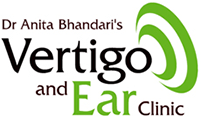Some of the most common causes of vertigo are as below
BPPV or Benign Paroxysmal Positional Vertigo is one of the commonest causes of vertigo and dizziness. The patient typically complains of spinning episodes brought on by change in position or moving the head. It usually is short lasting for a few seconds. However some patients complain of longer lasting dizziness or heaviness in the head.
Labyrinthitis is caused by bacterial infection of the balance and hearing nerve in the inner ear leading to intense vertigo, hearing loss and ringing in the ear.
This condition usually starts after sea or air travel with the patient feeling a rocking or floating sensation. The unsteady feeling usually decreases during driving and alcohol consumption. Patients suffering from MdMS require vestibular rehabilitation.
This is caused by increase in the pressure of the fluid present in the inner ear. The patient has spells of vertigo, ringing in the ear and hearing loss, usually in one ear.
Sometimes, some medicines may damage the nerves of balance or hearing causing dizziness and hearing loss. Some commonly used drugs, which are ototoxic, are aspirin, anti-malarial and anti-TB drugs, and antibiotics ending with – mycin. Early diagnosis of ototoxicity is done by Dynamic Visual Acuity(DVA) testing and Audiometry.
Patients usually identify migraine with headaches. But migraine may also present in the form of vertigo or dizziness. These patients often complain of spinning or unsteadiness, sound intolerance and motion sensitivity. Lifestyle changes and medical treatment are the mainstay of treatment.
Vestibular neuritis is caused by the infection of the nerve of balance; the patient complains of intense nausea and vomiting along with vertigo. It may last a few days leading the patient to be confined to bed. Early diagnosis and vestibular rehabilitation help in faster recovery.
Acoustic Neuroma, also called Vestibular Schwannoma, is a slow growing non-cancerous tumour of the Vestibulocochlear nerve. This nerve is responsible for conducting impulses regarding hearing and balance from the ear to the brain.
Multiple Sclerosis (MS) is a demyelinating disease affecting the central nervous system. It has an auto-immune origin in which the body’s own immune system attacks the myelin sheath of nerve fibers. This myelin sheath is a protective cover of the nerve and facilitates nerve conduction.
Superior semicircular canal dehiscence or SSCD is a condition which has only recently been identified; it was first described by Lloyd Minor in 1998. This condition affects the inner ear leading to auditory and vestibular symptoms.
Tinnitus is the sensation of sound heard by the patient, which may be described variously as ringing, buzzing, hissing, etc. McFadden defined sound as the conscious experience of sound that originates within the head of its owner, in other words without any external source.
In this condition, the patient suffers from short spells of vertigo which occur recurrently. It is due to compression of the vestibular or balance nerve.

